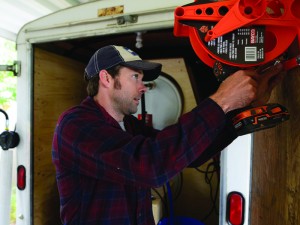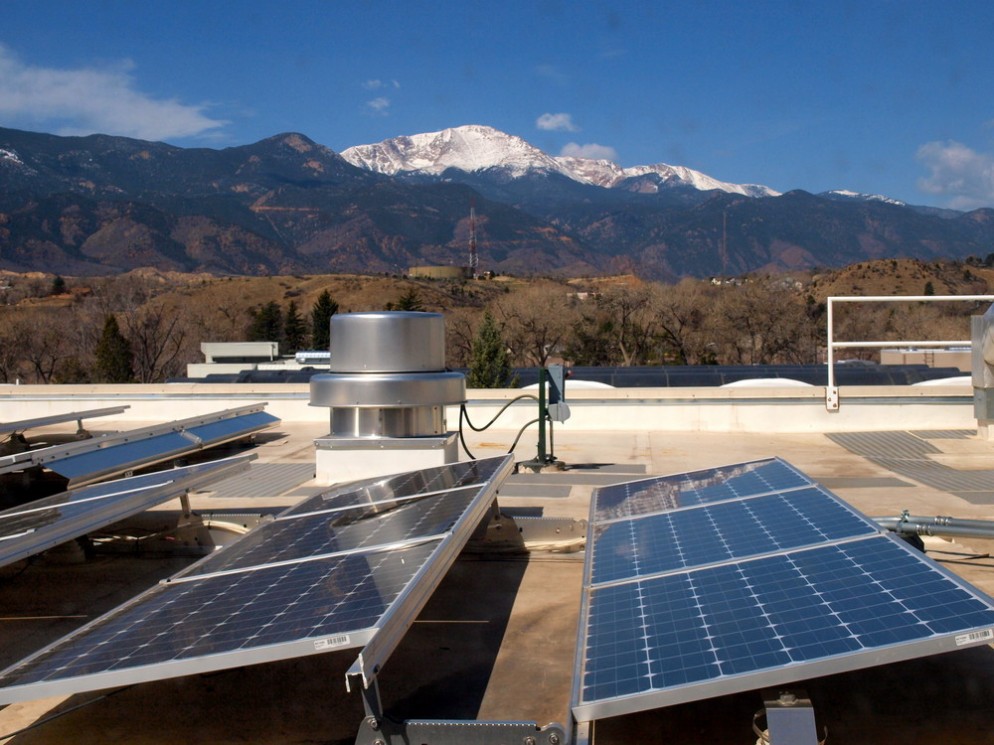Related Stories
Solar often claims Big Man on Campus status — with flashy panels, photogenic impact, and a certain sustainable swagger — but it’s not the only player with a stake in the game.
“The typical reaction, when you say sustainability, is that people think of environment,” said Ian Johnson, Colorado College’s sustainability director. And on a college campus, he added, that usually ends up manifesting itself through buildings and structures (like those solar arrays), energy use, water use, and the associated carbon footprint.
But it’s really only a third, or perhaps a quarter, of it.
“The other pieces are the financial side. Things have to be financially sustainable in the long run or they’re going to fall apart,” Johnson said. “They have to be socially sustainable as well — that’s the least understood piece of sustainability. At the core of the concept of sustainability, we’re really talking about our human experience within our ecosphere, and about making that a thriving experience for everyone. The concept of a thriving community applies universally to all ages, income levels, education levels, races, sexual orientations, religions, and all other classes and groups of people. Making sure that we’ve got equitable resources and equitable opportunities really comes into play in the discipline of sustainability.”
Underpinning all three of those pieces is what Johnson believes is key to all of it: community.
“We can focus on the triple bottom line — the financial, the environmental, and the social side — but if we aren’t doing that where we live and creating a just and resilient community where we live, then we’re really still missing the point of it.
“So it all comes back to the cliché of ‘think globally, act locally.’ ”

Sustainability Director Ian Johnson works on a filtration system for CC’s Veggie Van. The system will filter out particles and moisture from waste vegetable oil gathered from food service operations. The oil will then fuel the van. Students will be able to use the van for trips locally and regionally.
Spend even a little time with Johnson over coffee and you’ll be impressed by the web of community connections that are happening across campus and throughout the Pikes Peak Region.
From collaborating with local nonprofits to help generate offsets in order to reach CC’s goal of carbon neutrality (See “Taking Care with Carbon”) and partnering with local farmers on campus food services, to planning for a possible eco-village on the east side of campus and buying into SunShare community solar gardens (a project founded by David Amster-Olszewski ’09), many of the sustainability-related projects happening at CC engage folks and ideas from all over.
One project in particular, Sense of Place programming, debuted at New Student Orientation last year. About 700 students (first-years and Priddy outdoor education trip leaders) participated in a “Field Guide to Colorado Springs” workshop, learning about local ecology, geology, natural and cultural history, food and watersheds, energy and waste systems, and area amenities.
“All of it is at a very broad level,” Johnson said, “but really trying to incite students, to pique their interest in some way, shape, or form.”
Sense of place means something different to everybody, he added, but this project encourages students to “dig in and start to investigate other aspects of this place and really make it their home, make it their study grounds for the next four years.”
All of these projects are part of what helped kick CC from a Silver Rating through the Association for the Advancement of Sustainability in Higher Education’s Sustainability Tracking, Assessment, and Rating System (STARS) last year (CC’s first year to apply) to a Gold Rating this summer.
Of course those ratings wouldn’t have been possible without leadership, primarily over the past four years, by the 40-plus-member Campus Sustainability Council: adding various sustainability components to the college’s strategic plan in 2011 (including prioritizing staffing — hiring both Johnson and Mark Ferguson, campus operations and plant manager, in 2012); lobbying for and successfully increasing dedicated budget for projects; and presenting a plan and strategy for reaching CC’s carbon neutrality goal.
“The model is a little bit different, in that we’re not working strictly out of our office anymore,” Johnson said. “It’s not the black box of sustainability anymore. We’re really pushing tentacles out into the rest of the campus and trying to make it a core piece of what everybody’s doing.”
“We’re just infiltrating,” he said with a laugh. “Taking over the world.”
